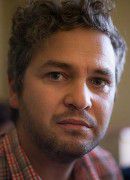Professor Andy Philippides
Professor Andy Philippides
Professor Of Biorobotics
Telephone: 01273 678129
Email: andrewop@sussex.ac.uk

Insect visual navigation: a computational approach
Project co-supervised by Dr Paul Graham
Navigation is a vital task for many animals with convergent perceptual learning and cognitive strategies seen across taxa. Insects being practical to study and ‘robotic’ in their behaviour are an excellent model system in which to study this behaviour. Some ants (eg the Australian desert ant, Melophorous bagoti) are particularly good examples as they are expert navigators, learning long routes through complex terrain with single trial learning, despite relatively small brains and low-resolution vision.
What’s more, it is feasible to track foraging ants in their natural habitat and, indeed, over the entire course of their life above ground. As it is not yet feasible to record from the brains of ants foraging in natural environments, we use computational models to tie behaviour to the underlying neural processes. For instance, based on behavioural observations and modelling, we have developed a new route navigation algorithm capable of robust navigation through complex environments which shows many characteristics of ant behaviour.
This interdisciplinary PhD project will similarly use computational and robotic modelling constrained by data from biological experiments to shed light on the neurobiology of visual learning and navigation, with a potential secondary benefit of improving robotic navigation algorithms. Excitingly, we have recently developed methods based on which allow us to recreate the visual experience of foraging ants in natural environments, giving us access to their whole visual history. The project will use this resource to answer key questions such as: What visual features are encoded as memories? How are these memories stored, recalled and used? How does visual navigation interact with other innate behaviours such as path integration and learning walks?
The project would suit somebody with a biological background interested in learning computational methods, or someone with a technical background interested in studying biology.
As well as the specific project mentioned above, I have collaborated widely within Sussex Neuroscience on computational aspects ranging from modelling, through data analysis to experimental design and would be happy to guide students in these areas if they are doing a rotation which requires computational advice. I have collaborated with Paul Graham, Thomas Nowotny, Jeremy Niven, Kevin Staras, Sarah Garfinkel, Tom Collett, Chris Buckley, Catherine Hall and Chris Bird.
Key references
- Baddeley B, Graham P, Philippides A and Husbands P (2012) A Model of Ant Route Navigation Driven by Scene Familiarity. PLoS Comput Biol 8(1): e1002336.
- Philippides, A., Baddeley, B., Husbands, P. and Graham, P. (2012) How Can Embodiment Simplify the Problem of View-Based Navigation? In Prescott, T. et al. (eds): Living Machines 2012, LNCS, 7375: 216-227. Springer Berlin/Heidelberg.
- Wystrach A, Mangan M, Philippides A, Graham P (2013). Snapshots in ants? New interpretations of paradigmatic experiments. J. Exp. Biol. 216, 1766-1770.
- Philippides A, Baddeley B, Cheng K and Graham P (2011) How might ants use panoramic views for route navigation? J. Exp.Biol, 214, 445-45
Visit the Insect Navigation Group pages for more details and a full list of publications.